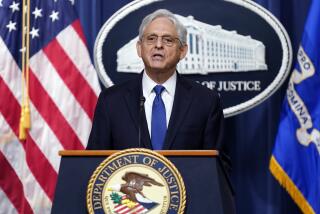Justice Dept. Won’t Defend ‘Must-Carry’ Cable Rule
- Share via
In an unusual move, the U.S. Justice Department has decided not to defend the government against lawsuits seeking to strike down a provision of the recently passed cable re-regulation law that allows local broadcast stations to demand that their programs be carried on cable systems.
In a two-page letter sent to Vice President Dan Quayle on Wednesday, Assistant Atty. Gen. Stuart M. Gerson said similar “must-carry” measures have been struck down twice by the courts. In addition, he wrote that President Bush, who opposed the cable measure, is the “ultimate client” of the Justice Department and thus an “ethical conflict of interest would be created were the department now to defend these actions of the statute.”
Last month, Bush vetoed the cable-TV bill, which would also impose price controls on cable service. But it was overridden by the Democrat-controlled Congress, the first time a Bush veto was set aside.
The Justice Department’s decision came a day before lawyers were to submit legal briefs in U.S. District Court in Washington, where Turner Broadcasting System Inc. has filed suit against the U.S. government and the Federal Communications Commission to overturn the must-carry rule of the Cable Television Consumer Protection and Competition Act of 1992.
Turner, which operates Cable News Network and Turner Network Television, has been joined in the litigation by several cable operators including Time Warner Inc. of New York and Denver, Colo.-based Daniels Communications Inc.
The cable operators argue that the must-carry rule violates the First Amendment because the government is seeking to regulate what video programming cable operators and affiliated programmers can air. They also say the rule gives broadcasters an unfair competitive advantage since advertisers on the local broadcast stations will also be seen by a far larger cable audience for free.
The Justice Department’s decision would leave the federal government without a legal advocate to defend the must-carry rule, unless Congress--which is out of session until January--reconvenes and appoints a special legal counsel before the cable lawsuits are scheduled to be heard on Dec. 7.
“It would take a resolution of the Senate to authorize me to appear or intervene and defend the constitutionality of an act of Congress,” said Michael Davidson, Senate counsel. “That’s pretty rare. It’s happened maybe 10 times” in the last decade.
As senator, Vice President-elect Al Gore was one of the prime sponsors of the cable measure. This led some critics to charge Thursday that politics--not legal ethics--was behind the Justice Department’s action.
“It is most extraordinary . . . political decision-making,” said Andy Schwartzman, executive director of Media Access Project, a public interest law firm. “It’s a signal from the Bush Administration to leave no prisoners.”
More to Read
The biggest entertainment stories
Get our big stories about Hollywood, film, television, music, arts, culture and more right in your inbox as soon as they publish.
You may occasionally receive promotional content from the Los Angeles Times.










